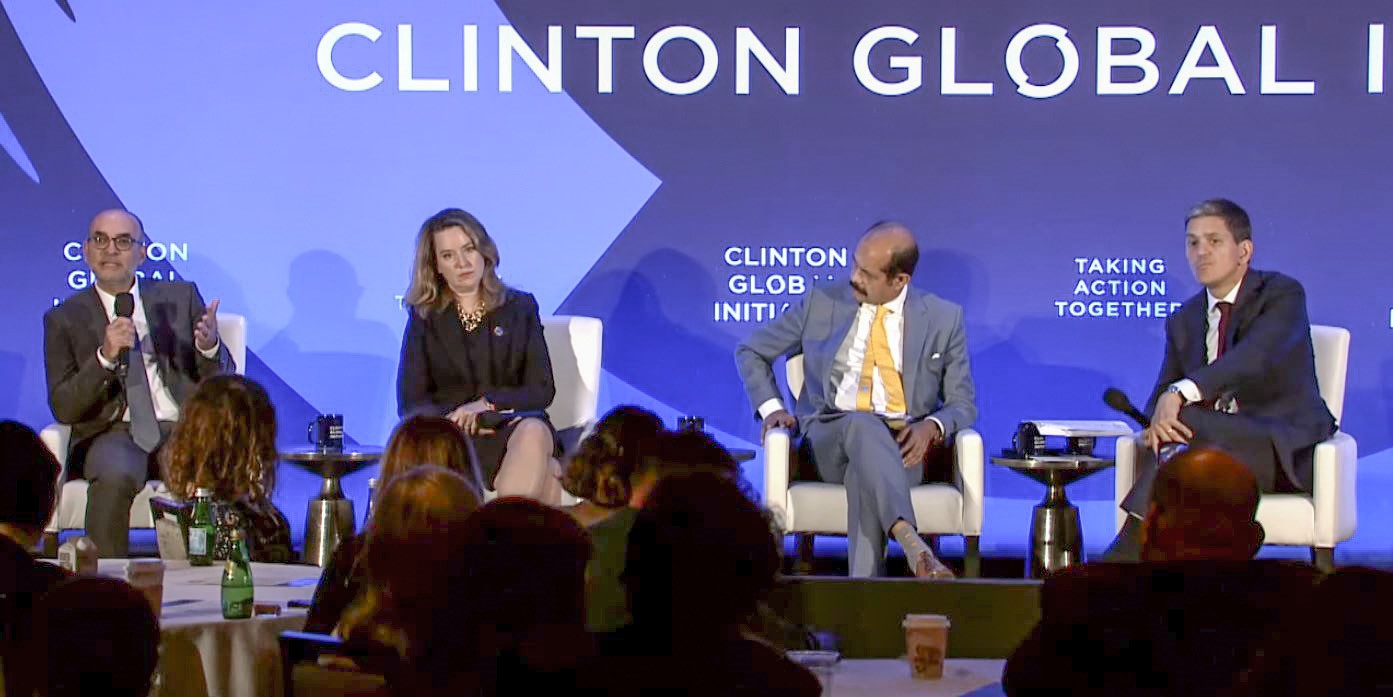Panel highlights need for collaboration on climate-induced migration
Climate and EnergyArticleSeptember 22, 2023
A panel of experts at a Climate Week NYC event discussed the impact of climate change on global migration and the need for climate advocates and humanitarians to work in tandem to address the issue.
The event, “Forced Migration and Climate Change: How we can empower communities to cope with climate induced displacement,” was part of the Clinton Global Initiative 2023 meeting, which took place September 18 and 19 in New York.
David Miliband, President and Chief Executive Officer of International Rescue Committee, moderated the event, which included a one-on-one discussion with Amali Tower, Founder and Executive Director of Climate Refugees. It also featured a panel discussion with Amar Rahman, Global Head of Climate Resilience for Zurich Resilience Solutions; Atiqul Islam, Mayor of Dhaka North City Corporation in Bangladesh; and Amy Pope, Director General-Elect of the International Organization for Migration.
Miliband set the stage with some alarming statistics: there are 54 civil wars going on in the world; 110 million people have been displaced by conflict and disaster around the world; and 350 million people are suffering from food insecurity. Playing a role in each: the climate crisis.
“Climate spawns competition over resources, which is a source of conflict,” he said. “Disasters or global warming associated with more extreme weather events drives people to move. And food insecurity is obviously a significant part of the challenge.”
Miliband said that the climate movement and the humanitarian movement have not worked well together to address these interconnected challenges, but there is renewed urgency to do so.
Tower sat down with Miliband and talked about the need for more and better data on climate-induced migration.
“In climate change, we have sudden-onset disasters — cyclones, hurricanes, storms — things that happen rather unexpectedly, and they’re happening with increased frequency and intensity,” she said. “And we also have slow-onset climate change events — drought, rising sea levels, environmental degradation to some extent. Those things are happening incrementally, and we’re not gathering that data nearly enough.”
Risk mapping on a local level
Rahman was asked about the risk mapping of climate change and the difficulty of comparing climate risks in different geographical regions. He acknowledged that the climate crisis is affecting different countries in different ways, but the impact can also be felt differently on a local level.
“The situation changes from neighborhood to neighborhood. From house to house, the risk situation can change,” he said.
Rahman said it’s important to assess not just the hazard but also the level of exposure.
“You could have a very low hazard level. You could have only a couple of inches of rain, but if you have a high exposure and you have no controls around that exposure, the risk is very high,” he said.
Zurich Resilience Solutions takes a holistic view of climate risk, he said, looking at more than just the changing climate.
“We talk about climate change, but we go one step farther. It’s the change in the environment. What does that mean? You’re having higher populations in some areas, the infrastructure is degrading, the level of protection, the quality of protection is not being maintained, and that makes the situation worse.”
The session is available to watch on demand at the Clinton Global Initiative site.
Zurich Insurance Group recently published a research paper, “Accelerating the Climate Transition: Long-term thinking for near-term action,” that explores areas where the climate transition can be accelerated. It is based on the Sustainability Executives Survey of 668 executives who have responsibilities related to sustainability within their companies.
The Clinton Global Initiative brings together established and emerging global leaders to create and implement solutions to the world’s most pressing challenges, including climate resilience, health equity, and inclusive economic recovery and growth.
Climate Week NYC is an annual climate event that brings together some 400 events and activities across New York.
